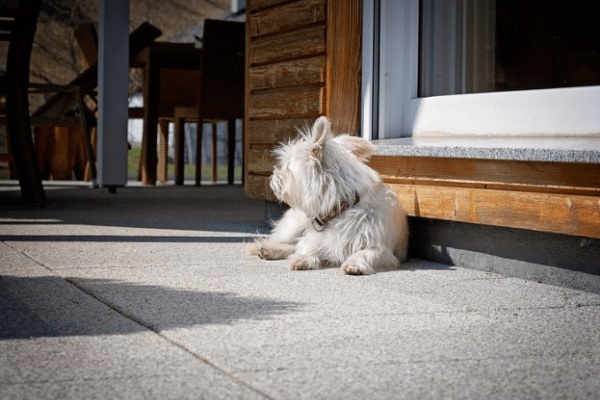Border Collie Shedding: 7 Shedding Causes & Controls

Border collie shedding can become a problem for most owners which is why it is important to understand the causes of excessive border collie shedding.
Since border collies shed, we will be discussing what can trigger off excessive shedding and the most common ways to prevent excessive shedding in border collies.
I will do my best to keep this post very simple as possible, so keep reading…
Border Collie Shedding
Yes, both smooth or rough coat border collies shed all year, although their shedding rate is quite modest, they shed the most in the spring and fall, with the spring shedding being the heaviest.
Although there are no proven strategies to totally stop dogs from shedding, there are several habits that can help prevent excessive shedding, which we will discuss in this piece.
If you really want to know if a border collie sheds, buy a long comb with a lake-like tooth and clean your dog first thing in the morning.
The pace at which a border collie sheds hair is determined by a variety of factors that we shall detail and explore.
Why do border collies shed so much?
The following are some of the most common causes of excessive shedding in border collies which includes:
1. Poor nutrition
This is probably one of the most common reasons for excessive shedding in border collies, and it is purely on the owner.
If a border collie’s meal isn’t balanced, he or she shed more than usual. Border collie health is affected by poor diet.
If you observe any unusually excessive shedding after changing your border collie’s diet, switch back or consult a veterinarian, whether it’s winter or spring.
A balanced border collie food contains the nutrients and vitamins required to maintain healthy skin, strong hair follicles, and little shedding.
Omega-3 fatty acids have been proved to help border collies produce healthy hair, so including them in their diet is always a good idea.
Border collies require a moist diet because dry skin or dehydration can cause undesired hair loss.
2. Diseases or infections
Excessive shedding in border collies is caused by bacterial infections, fungal infections, and infestation or other related illnesses.
These health issues are often painful and contribute to hormonal imbalances, which result in increased shedding.
Bacterial illnesses like salmonella can be contracted by eating raw foods like raw chicken.
A fungal infection, which can occur if your border collie comes into contact with mold or other forms of fungus, maybe the cause.
Snacks and dry foods can grow mold, so store them carefully after each use. So be careful with what you give to your border collie.
Snacks and dry foods can mold if not properly stored after each usage.
Keep in mind that border collies are curious dogs that will sniff out whatever they can find in the crevices of your home.
As a result, make sure your home and the locations where your border collie spends time are clear of mold.
If Border Collies inhale spores on the ground while walking, they may shed profusely.
3. Allergic response
A border collie’s skin may get inflamed and shed due to allergies to particular foods or toxins in the environment.
As a result of the allergy, your border collie may scratch, lick, or bite himself, producing considerable hair loss.
Allergies in border collies can be caused by a variety of factors, including food, dust, medication, and insect stings.
A border collie’s hair falls out as a result of an allergic response on their skin when they come into touch with anything they are sensitive to.
This is an uncommon type of shedding that only happens once in a while.
If you find any allergy triggers, keep them out of the reach of your border collie.
If you need to change shampoos for your Border Collie, see your veterinarian first.
Make an appointment with your veterinarian if you’re concerned about your border collie’s excessive shedding due to allergies.
4. Seasonality
While seasonality influences the pace or degree of shedding, one of the primary causes of border collie n’s shedding is the season.
In the spring, there will be a lot more border collie hair shedding than in the winter.
Therefore, it’s reasonable to think that the season has an impact on border collie shedding.
Border Collies shed their winter coats in the spring to escape the heat and lose hair during the summer to strengthen their winter coats.
Keep your border collie’s temperature down in the spring since warm weather causes them to sweat less.
If you don’t look after your border collie throughout the summer, you’ll be surprised at how much they shed.
5. Hormonal changes
Hypothyroidism is a hormonal disorder in dogs that can result in significant hair loss.
It affects the thyroid glands of border collies, causing a thyroxine deficiency, which is a hormone that regulates metabolism.
This sickness causes hair loss, a dull and thin coat, discolored skin patches, fatigue, a lack of enthusiasm for exercise, and weight gain.
If your female border hasn’t been spayed, her heat cycles may impact the amount of fur she sheds at any one time.
You could see her shedding more hair at the end of her cycles.
Hair loss driven by hormone changes refers to all of these causes of hair loss.
6. Parasite infestations
Border collies who go outside are susceptible to parasites such as fleas, mites, and lice, but they shed a lot as a result of the onslaught.
A single bite from one of these insects can result in a variety of problems, including excessive shedding.
Bug bites annoy border collies, and this bite may result in shedding, despite the small amount of shedding.
If your border collie has a parasite, she will keep shedding until the parasite is gone.
As a result, the border collie will be itchy and scratched, sometimes resulting in bald patches.
Keep your border collie away from flea bites since they can trigger serious allergic responses.
7. Age factor
Between the ages of five and seven months, Border Collie puppies are known to go through a puppy period in which they lose their infants.
However, you might argue that older border collies lose more hair since they are larger and have a larger surface area of hair.
Border Collies over the age of eight are more prone to health issues, which can result in hair loss.
When Border Collie puppies outgrow their puppy coat, which happens around four months, they shed a lot more.
They’ll continue to shed until they reach maturity. Excessive shedding in border collies is also a sign of old age.
How to control shedding in border collies
The following are some of the most frequent methods for controlling or reducing shedding in border collies:
1. Weekly brushing of your border collie
This sounds like a great job, but that is the price you pay for keeping a border collie and avoiding seeing fur all over your house.
One of the most effective ways to reduce excessive shedding is to use a brush to cure border collie hair loss.
Brushing not only enhances blood flow to the skin’s surface but also helps natural lipids disperse.
Because chihuahuas adore goodies, give them before and after brushing.
Brushing your border collie for 7-10 minutes is suggested on average.
Brush your border collie at least once every six days, depending on your schedule; if you’re busy, brush once every nine to ten days.
When determining why border collies are shedding, brushing them once a week should be considered a prophylactic measure.
Long-haired border collies require a pin brush or a slicker brush to comb their long hair in and out of season.
Border collie puppies require extra care during grooming sessions due to their small stature.
2. Give your border collie a bath
When it comes to shedding reduction, Border Collies benefit from monthly bathing and the use of de-shedding dog shampoo.
Bathe your border collie once a month to prevent excessive shedding and maintain their coat clean.
Also, don’t be frightened if your border collie is eliminating a lot of stray hair in the bath.
Border collies shed a lot, but this isn’t an issue when it comes to washing time.
Before bringing them back into the house, make sure they’re totally dry with a towel or a blow-dryer, and be gentle around their closed eyes.
3. Give high-quality dog food
Keep an eye on your border collie’s food consumption. A well-balanced diet promotes healthy skin and reduces shedding in all dogs.
A border collie’s diet should be well-balanced and nutritious.
The condition of your border collie’s coat is influenced by how well you feed him.
Feeding your border collie a well-balanced diet will help reduce even a little hair loss on the inside.
Your border collie’s hair and skin will be as smooth and healthy as possible if she eats dog chow high in Omega-3 fatty acids, oils, and minerals.
Natural fatty acids like omega-3 and omega-3 fatty acids, which are particularly helpful to border collies and help keep their skin and hair in good form, are commonly found in dietary supplements.
4. Avoid all forms of allergies
Itchy ears, frequent biting at your border collie’s skin, tears welling up in your border collie’s eyes, and frequent licking of the paw or skin are all symptoms of an allergic response.
Eliminating allergies is one of the most critical things you can do to protect your border collie from shedding excessively.
To name a few allergens, pollen, mold spores, dust mites, and dead skin cells can trigger allergic responses in border collies.
Keep a watch on your dog’s skin or hair for rashes or hair loss that might suggest a food allergy.
5. Always keep your border collie hydrated
To avoid dry skin and to raise your dog’s body temperature, make sure your border has access to clean drinking water at all times.
This is critical because dogs with insufficient water intake have dry skin and hair, which contributes to excessive shedding.
The chance of hazardous germs being swallowed is reduced if your dog’s water dish is kept clean and full.
Check your dog’s water bowls to make sure they’re only drinking clean water.
Dehydration can cause shedding and other health problems in small dogs like border collies.
As a result, make sure your dog has fresh water at all times.
6. Avoid stale food and table scraps
Eating table scraps or stale food can cause gastrointestinal distress in border collies, which can lead to excessive shedding.
Are you aware that letting your border collie eat table leftovers on the floor might cause a bacterial infection?
Allowing your border collie to eat on the ground is not a smart idea; instead, feed your dog from a clean container.
Allowing your border collie to steal food from the table while you’re eating is not a smart idea, so don’t allow them.
Border collies’ stomachs are sensitive, and they may vomit if they eat stale food or table scraps, so keep them away from these.




![Do French Bulldogs Shed A Lot [9 Shedding Causes] Do French Bulldogs Shed A Lot](https://petcreeks.com/wp-content/uploads/2021/07/Do-French-Bulldogs-Shed-A-Lot-768x644.jpg)

